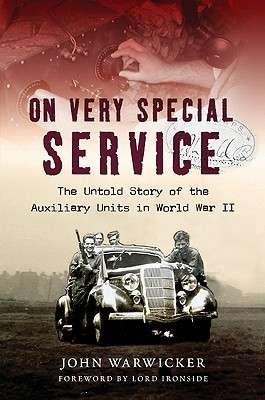
Churchill's Underground Army: A History of the Auxillary Units in World War II
Check my rate
| Main centres: | 1-3 business days |
| Regional areas: | 3-4 business days |
| Remote areas: | 3-5 business days |

| Main centres: | 1-3 business days |
| Regional areas: | 3-4 business days |
| Remote areas: | 3-5 business days |
Frontline Books, 2008, illustrated, index, 266 pages, condition: new.
A carefully researched book on a long-neglected subject which fills a major gap in our Second World War knowledge Norman Longmate, author of If Britain Had Fallen
British Secret Intelligence Service officers and others in the War Office were never convinced that appeasement would prevent a Nazi invasion. Defying high-level opposition, they quietly worked instead on preemptive Last Ditch survival plans. These included a secret resistance network known as the GHQ Auxiliary Units. It was the only one in Europe prepared in advance of an enemy assault.
The Auxunits were civilian stay-behinds. One section worked as Patrols, usually consisting of half-a-dozen men in hidden underground operational bases. They were hurriedly selected immediately after the Dunkirk evacuation then trained and equipped with firearms, explosives and booby-traps. Instructed to stay-behind underground as the enemy passed over, they were then to emerge each night to commit mayhem for as long as they could stay alive. Others, men and women, would remain behind above ground, to spy on the enemy and communicate intelligence to the Defence Force by a covert radio network. These Units are still effectively secret and this is the most comprehensive history published to date.
An excellent follow on from Lampe's "The Last Ditch". In this book Warwicker has the advantage of A considerable body of documentation and primary accounts that Lampe lacked. This is a serious academic work yet it remains a gripping read and answers a few of the questions left, or unasked, in Lampe's ground breaking work. One of the key areas covered here is the deep involvement of the British secret/security services in establishing and operating the Auxillary Units. As these organisations were never officially acknowleged as existing talking about their work would have been difficult. Likewise the legally dubious status of the stay-behind army under the laws of war made for potentially difficult questions. Another interesting argument about the Units concerns their use as being expected to create a spirit of resistence in a perhaps weary population as a result of revenge for acts of retribution expected from fascist forces stemming from Auxillary Unit activity. The closeness of the project to Churchill and some of the other issues (such as defensive utilisation of gas against an invader) are discussed and it becomes clearer why not talking about the units probably seemed a very good idea. It is interesting to have a pretty clear narrative about the competing organisations and individuals who left their mark on the units and affected their potential utility. Having never been called upon to do what they were set up to do it is still an academic question as to how, if, the units would have made a useful or prolonged impact agaisnt a fascist invasion. However this book does look at how Unit members contributed to special forces overseas as the war turned in the Allied favour. The final chapters cover speculation about involvement of Auxillary Unit members in actions outside the mainland, the arrival of Rudolph Hess in the UK and a very interesting piece on the Special Duties Section and communications equipment.
While it is perhaps understandable that there were valid reasons of state for restricting what was said about the Auxillary Units it is unfortunate that this meant that the contribution of many to the fight against German fascism was not properly recognised and many of those who should have been recognised had to fight their own corner for it. This is a fascinating story still now only partially told and one which went on to influence and effect the post WWII world. Highly recommended.